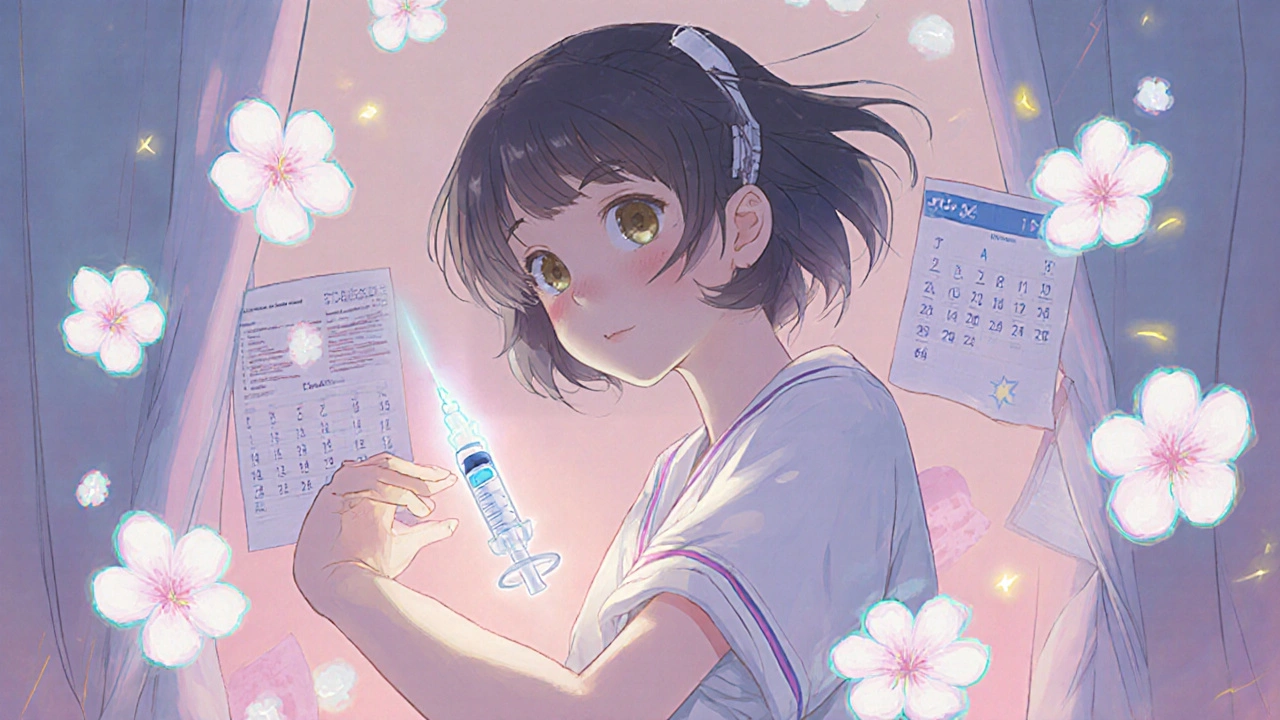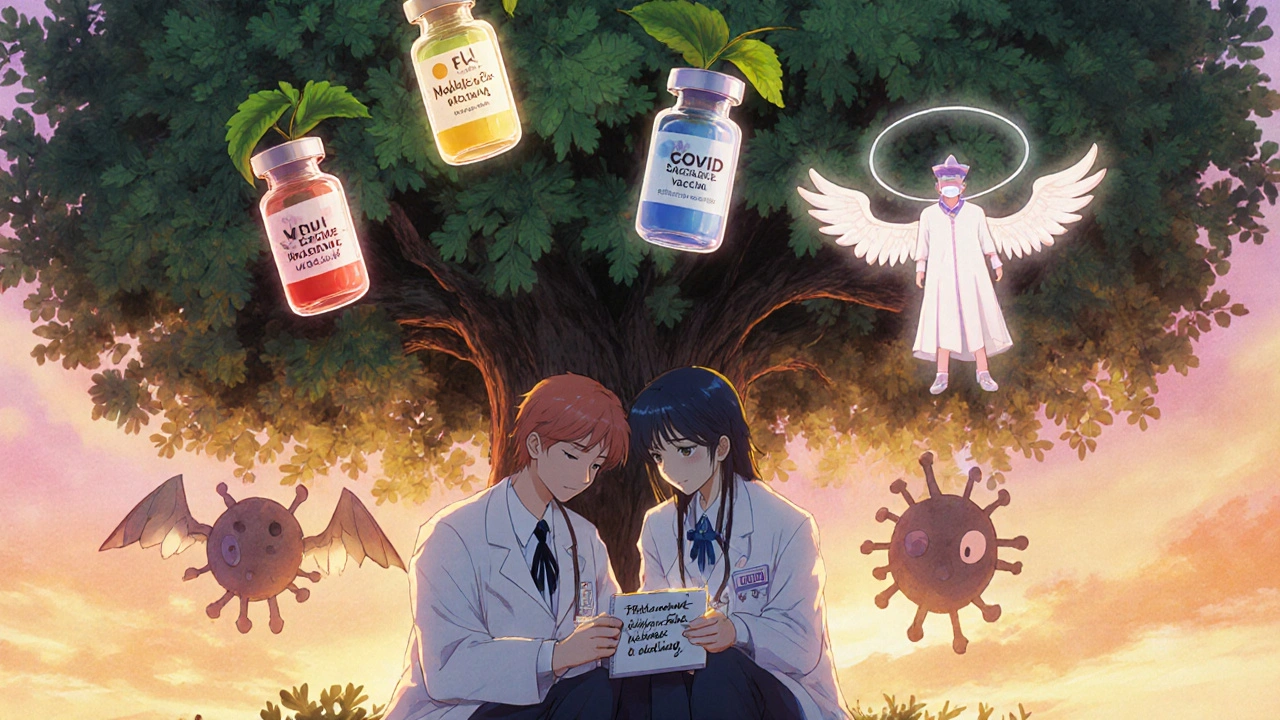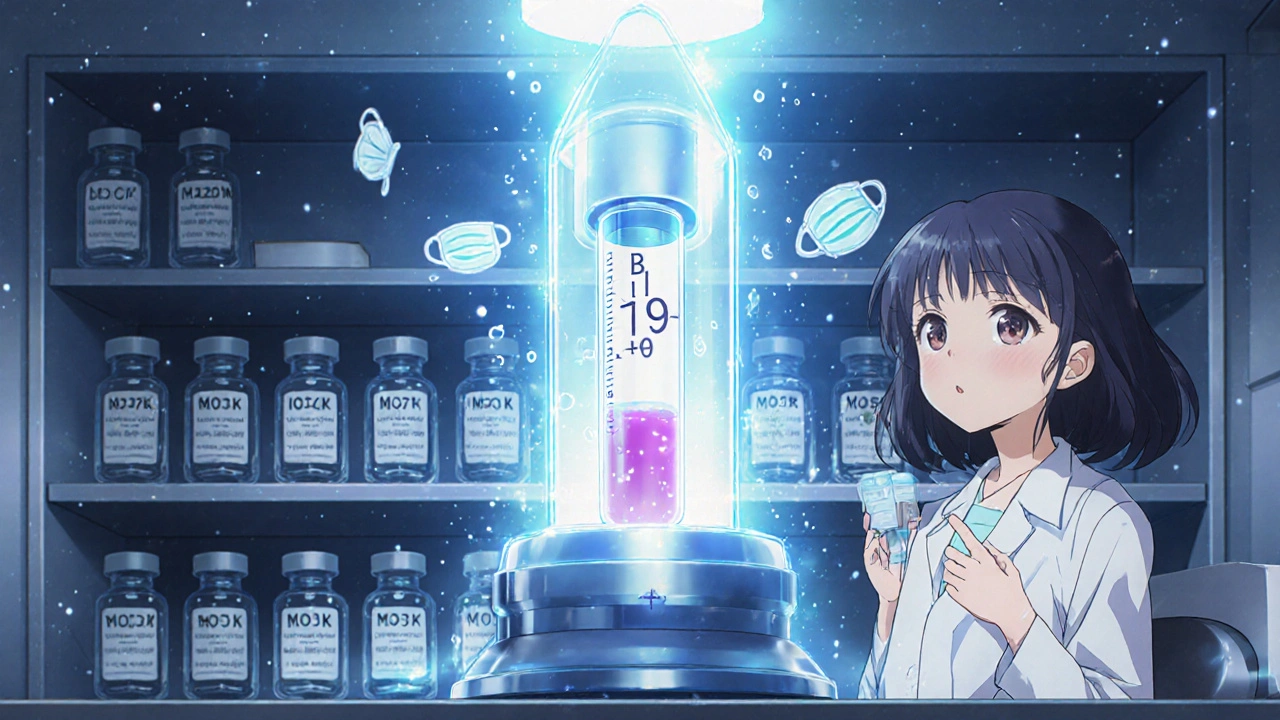
Getting vaccinated when you’re on immunosuppressive drugs isn’t like getting a shot for most people. It’s not just about showing up at the clinic. It’s about vaccine timing, medication schedules, and understanding that your body might not respond the way it should-even if you do everything right.
Think about someone with rheumatoid arthritis taking methotrexate, or a kidney transplant patient on rituximab. They’re told to get the flu shot, the pneumonia vaccine, and the latest COVID-19 booster. But if they get it at the wrong time, the shot might not work at all. Studies show that for some people on these drugs, vaccine effectiveness can drop by half or more. That’s not a small risk. That’s the difference between protection and vulnerability.
Why Timing Matters More Than You Think
Immunosuppressive drugs don’t just calm down your immune system-they silence parts of it. That’s good for stopping your body from attacking your joints or your new organ. But it’s terrible for helping your body learn to fight viruses through vaccines.
When you get a vaccine, your immune system needs time to recognize the threat and build a memory. If you’re on a drug that kills off B-cells-like rituximab, ocrelizumab, or ofatumumab-your body can’t make the antibodies needed to block the virus later. That’s why timing isn’t optional. It’s critical.
For example, if you’re on rituximab, the best window to get most vaccines is 4 to 5 months after your last infusion. Why? Because that’s when your B-cells start coming back. Get the shot too soon, and your immune system is still too weak. Get it too late, and you’re risking exposure to infections while waiting.
And it’s not just B-cell drugs. Methotrexate, a common treatment for autoimmune diseases, can blunt the flu vaccine’s effect. The American College of Rheumatology recommends holding methotrexate for two weeks after getting the flu shot. That’s a simple change, but it can boost your antibody response by up to 30%.
What to Do Before Starting Immunosuppressive Therapy
The ideal scenario? Get all your vaccines done before you start treatment. That’s the golden rule across every major guideline-from the CDC to the Infectious Diseases Society of America (IDSA).
If you’re about to begin treatment for lupus, Crohn’s disease, or multiple sclerosis, ask your doctor to schedule your vaccines at least 14 days before your first dose of any immunosuppressant. That gives your body a fighting chance to build up protection while your immune system is still functioning normally.
Some vaccines need multiple doses. The hepatitis B series takes three shots over six months. The shingles vaccine (Shingrix) requires two doses, 2 to 6 months apart. Plan ahead. Don’t wait until you’re already on medication to realize you missed your window.
For transplant candidates, this isn’t just advice-it’s standard protocol. Many transplant centers won’t even list you for surgery unless your vaccination record is complete. It’s not about being rigid. It’s about survival.
Timing Vaccines While on Treatment
What if you’re already on treatment? It’s not hopeless. But you need a roadmap.
Here’s what the experts say, broken down by drug:
- Rituximab and other B-cell depleters: Wait 4 to 5 months after your last infusion. Some specialists, like those at Memorial Sloan Kettering, recommend waiting 9 to 12 months for the best response. But if community infection rates are high, don’t wait. Get the shot as soon as you can-even if it’s only 2 months after your last dose. Protection, even partial, is better than none.
- Methotrexate: Hold your dose for two weeks after the flu shot. No need to stop it for other vaccines unless your rheumatologist says otherwise.
- Prednisone (steroids): If you’re on more than 20mg a day, delay non-flu vaccines until your dose drops below that level. High-dose steroids shut down immune responses across the board.
- Anti-TNF drugs (like adalimumab or infliximab): These are less disruptive than B-cell drugs. You can usually get vaccines on schedule. Still, check with your doctor before getting live vaccines like MMR or shingles (Zostavax), which are generally avoided in immunosuppressed patients.
For solid organ transplant recipients, the timing is even more complex. The IDSA recommends waiting at least 3 months after transplant before vaccinating. The CDC says 1 month is acceptable. Why the difference? Because transplant patients are at higher risk of rejection if their immune system is stirred up by a vaccine. So the 3-month window gives the new organ time to settle. But if there’s a flu outbreak or a COVID surge, many centers will vaccinate earlier-because the risk of infection outweighs the risk of rejection.

How Effective Are Vaccines Really in These Patients?
Don’t assume that getting the shot means you’re protected. The numbers tell a sobering story.
A 2021 study from the Veterans Health Administration found that mRNA COVID-19 vaccines were 80.4% effective in people with inflammatory bowel disease on immunosuppressants. In the general population, that number was 94.1%. That’s a 14-point drop. For transplant patients, some studies show antibody levels as low as 20% of what healthy people produce after the same shots.
But here’s the twist: even when antibodies are low, T-cells might still be working. The CDC updated its guidance in late 2023 to reflect this. T-cells don’t show up on routine blood tests, but they help prevent severe disease. So even if your antibody test says “low,” you might still have some protection.
That’s why getting boosted matters-even if you’ve already had three or four doses. Waning immunity is real in immunosuppressed patients. The IDSA’s 2024 guidelines say everyone over 6 months old should get at least one dose of the current season’s COVID-19 vaccine, and more if your doctor recommends it.
Conflicting Guidelines? What Should You Do?
You might hear different advice from your rheumatologist, your transplant team, and your primary care doctor. That’s normal. Guidelines don’t always line up.
For example:
- The National Comprehensive Cancer Network (NCCN) says for patients with chronic lymphocytic leukemia, vaccines should be given “when available,” even during treatment.
- Memorial Sloan Kettering says wait until lymphocyte counts recover.
- The CDC says 1 month after transplant is fine.
- IDSA says 3 months.
So who do you listen to?
The answer isn’t in the guidelines-it’s in your situation. Are you in the middle of a flu outbreak? Are you about to start a new, aggressive treatment? Are you traveling soon? These factors matter more than a rigid timeline.
Dr. Thomas Hooten, who led the IDSA’s 2024 update, says shared decision-making is key. That means you and your doctor talk through your risks, your meds, your lifestyle, and your comfort level. There’s no one-size-fits-all answer.
And sometimes, the right choice is to vaccinate even if it’s not “ideal.” If you’re on rituximab and community cases are spiking, waiting 6 months could mean getting sick. In those cases, getting the shot now-even with lower effectiveness-is the safer bet.

The Biggest Problem: No Blood Test Tells You When You’re Ready
Here’s the frustrating part: there’s no simple test to tell you when your immune system is ready for a vaccine.
Doctors rely on fixed time windows because they’re easy to follow. But those windows are based on averages-not your body. Someone might recover their B-cells in 3 months. Someone else might take 10. But without a reliable biomarker, everyone gets the same schedule.
That’s changing. The NIH launched a $12.5 million study in early 2024 to see if measuring CD19+ B-cell counts can predict the best time to vaccinate after rituximab. If it works, we could move from “wait 6 months” to “get the shot when your B-cells hit 50 cells/μL.” That’s the future.
Until then, you’re working with imperfect tools. That’s why it’s so important to stay in close contact with your care team. Don’t assume your rheumatologist knows what your pulmonologist is thinking. Ask for a coordinated plan.
What You Can Do Right Now
Here’s a simple action list if you’re immunosuppressed:
- Check your vaccination record. Do you have the full series for pneumococcal, hepatitis B, and shingles (the non-live version, Shingrix)?
- Know your meds. Write down every immunosuppressant you take, including doses and last infusion dates.
- Ask your doctor: “When is the best time for my next vaccine based on my current treatment?” Don’t assume it’s obvious.
- If you’re due for a flu or COVID shot, don’t delay because you’re waiting for the “perfect” time. High community transmission means the risk of infection is higher than the risk of a slightly weaker response.
- Ask about antibody testing. Some clinics offer post-vaccine antibody checks. It’s not perfect, but it tells you if your body responded at all.
And remember: vaccines aren’t the only defense. Masking in crowded indoor spaces, washing hands, avoiding sick people-these still matter. Even if your vaccine didn’t work perfectly, these habits can keep you out of the hospital.
What’s Next?
The field is moving fast. In the next 2 years, we’ll likely see personalized vaccine schedules based on immune monitoring, not just calendar dates. New vaccines designed specifically for immunocompromised people-like higher-dose or adjuvanted versions-are already in trials.
But right now, the best thing you can do is be informed, be proactive, and speak up. Your immune system is working under heavy odds. Don’t let confusion or silence leave you unprotected.
Can I get live vaccines if I’m immunosuppressed?
No. Live vaccines like MMR, varicella (chickenpox), and the old shingles vaccine (Zostavax) are generally not safe for people on immunosuppressive drugs. They contain weakened viruses that could cause illness in someone with a suppressed immune system. Always use the non-live versions-like Shingrix for shingles or the inactivated flu shot instead of the nasal spray.
Do I need more than one dose of the COVID-19 vaccine?
Yes. The IDSA and CDC recommend additional doses for immunocompromised people. Most people in this group need at least three initial doses of the mRNA vaccine, followed by annual boosters. Your doctor will tailor the schedule based on your condition and prior doses. Don’t assume one or two doses are enough.
What if I miss the ideal timing for my vaccine?
Get it anyway. Missing the perfect window doesn’t mean the vaccine won’t help. Even a partial immune response reduces your risk of severe illness, hospitalization, or death. If you’re on rituximab and got your shot 2 months after your infusion instead of 6, you still have better protection than if you hadn’t gotten it at all.
Can my doctor check if the vaccine worked?
Yes, but it’s not routine. Antibody tests for COVID-19, hepatitis B, or tetanus can show if your body made a response. However, a negative test doesn’t always mean no protection-T-cells might still be active. These tests are most useful after vaccination to confirm whether you need another dose, not as a predictor of future protection.
Should I delay my immunosuppressant to get a vaccine?
Sometimes, yes-but only if your disease is stable. For methotrexate, holding it for two weeks after the flu shot is safe and helpful. For rituximab, delaying your next infusion by 2 weeks to get a vaccine is sometimes possible if your condition allows. Never stop or delay meds without talking to your specialist. The risk of a disease flare can be greater than the benefit of a slightly better vaccine response.
If you’re managing an autoimmune condition or recovering from a transplant, your vaccine plan needs to be as personalized as your treatment plan. Don’t treat it like a checklist. Treat it like a strategy-and work with your care team to get it right.
Douglas Fisher
November 25, 2025 AT 18:33Wow, this is so detailed-I’ve been on methotrexate for five years, and no one ever told me to hold it for two weeks after the flu shot. I just got mine last week… should I go back and ask for a repeat? I feel like I’ve been doing everything wrong. Thanks for laying this out so clearly.
Also, I didn’t know antibody tests were even a thing. My rheumatologist just says ‘get the shot,’ and that’s it. I’m gonna ask for one next time.
And yes-masking still matters. I wore a mask in the grocery store last week and got side-eye from three people. Worth it.
Bea Rose
November 27, 2025 AT 12:13So you’re telling me the entire medical system is just guessing when to vaccinate people?
And we’re surprised outcomes are inconsistent?
Albert Guasch
November 29, 2025 AT 04:31As a clinical immunologist with over two decades of experience managing immunocompromised populations, I must emphasize that the temporal dynamics of vaccine response in patients receiving B-cell-depleting agents are not merely a matter of waiting for lymphocyte reconstitution-they are governed by the kinetics of germinal center reformation, follicular helper T-cell repopulation, and plasma cell differentiation. The 4–5 month window referenced is derived from longitudinal seroconversion studies in rituximab-treated cohorts, but individual variability remains substantial.
Furthermore, the CDC’s 1-month post-transplant recommendation is an epidemiological compromise; the 3-month IDSA guideline is grounded in graft survival data. When community transmission exceeds 100 cases per 100,000, the risk-benefit calculus shifts decisively toward early vaccination-even with suboptimal serologic response. T-cell immunity, while non-quantifiable via standard assays, demonstrably reduces ICU admission rates by 68% in meta-analyses.
Practical takeaway: Coordinate with your care team. Don’t wait for the perfect moment. The perfect moment is when you’re alive to see it.
Ginger Henderson
November 29, 2025 AT 21:26So… we’re supposed to be doing all this math just to get a flu shot? I’m tired.
Can’t we just… not get sick? Maybe stay home? Or something?
Jesús Vásquez pino
December 1, 2025 AT 18:16Why are we even letting drug companies dictate this? You think they care if your B-cells are back? They just want you to keep buying boosters every 6 months.
I got my third shot two months after my rituximab. Didn’t feel a thing. No antibodies. No protection. But they still billed my insurance for it.
Someone’s making money off this chaos. And it ain’t me.
hannah mitchell
December 2, 2025 AT 15:27I appreciate the effort put into this. I’m on azathioprine and just got my booster last month. My doctor said ‘go ahead’ but didn’t give me specifics.
I’m just glad someone finally wrote this out without making me feel like a burden for asking questions.
vikas kumar
December 4, 2025 AT 03:23From India, where vaccines are often hard to get even for healthy people, this is gold.
Here, we don’t have rheumatologists who know about rituximab timing. We have general doctors who say ‘take the shot, it’s good.’
But I’m sharing this with my cousin who just got a kidney transplant. She’s scared. This gives her a roadmap. Thank you.
Vanessa Carpenter
December 4, 2025 AT 18:18I got my flu shot last week. I didn’t hold my methotrexate. I didn’t check my antibody levels. I didn’t even think about it.
But I’m still here.
Maybe the system isn’t perfect, but it’s still working-for now.
Michael Collier
December 5, 2025 AT 23:57It is imperative to recognize that the current paradigm of vaccination timing in immunosuppressed individuals is predicated upon population-level statistical norms, which inherently fail to account for inter-individual immunological heterogeneity.
As such, the emergence of biomarker-guided scheduling-particularly CD19+ B-cell quantification-represents a paradigm shift toward precision immunology. The NIH-funded initiative referenced is not merely incremental; it is foundational to the future of care delivery for this vulnerable cohort.
Physicians must transition from algorithmic adherence to contextual decision-making, integrating patient values, epidemiological risk, and therapeutic goals. This is not optional. It is the ethical imperative of modern medicine.
Shannon Amos
December 7, 2025 AT 20:12So let me get this straight… you’re telling me I have to schedule my vaccine around my meds like it’s a Tinder date?
‘Hey rituximab, can I get my shot in 4 months? Or should I wait till you’re feeling more generous?’
God, I miss the 2010s.
stephen riyo
December 9, 2025 AT 04:47Wait, so if I’m on prednisone and I get the flu shot, and then I get sick anyway… is it my fault? Or the doctor’s? Or the vaccine’s?
I just want to know who to blame when this doesn’t work.
Also, my cousin got shingles last year after her transplant. They told her it was ‘just luck.’
That’s not luck. That’s a system failure.
Mqondisi Gumede
December 10, 2025 AT 11:31Why are we trusting Western medicine to fix this? In South Africa we don’t have access to half this stuff. We have one vaccine center in a 300km radius and a doctor who doesn’t know what rituximab is.
You talk about B-cells like they’re a luxury. We’re lucky if we get the flu shot at all.
This post is for rich people with insurance. Don’t pretend this is about science. It’s about who gets cared for.
And the answer is: not us.
Bethany Buckley
December 11, 2025 AT 18:24As a scholar of immunological epistemology, I find the ontological insecurity of this discourse profoundly unsettling.
We are constructing a medical scaffolding based on probabilistic heuristics-yet we are asking patients to treat these heuristics as axioms. The absence of a validated biomarker is not a gap in knowledge; it is a rupture in the epistemic contract between clinician and patient.
Furthermore, the normalization of ‘partial protection’ as an acceptable outcome betrays a quiet nihilism in public health policy. We are not optimizing for immunity-we are optimizing for compliance.
And yet… I still got my booster. Because what else is there to do?
❤️